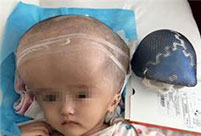

LONDON, July 22 -- An elderly man in northern England has become the first person in the world with macular degeneration to be fitted with a bionic eye, enabling him to see again.
The 80-year-old patient, Ray Flynn, has been fitted with the bionic eye in a breakthrough operation at the Manchester Royal Eye Hospital.
It has enabled the partially-blind pensioner to see again after taking part in the world's first trial of "bionic eye" technology.
The procedure helps restore vision by using implants in the retina of the eye to receive signals from a camera mounted on a special pair of glasses.
It was used at the hospital to tackle the previously untreatable age-related Macular Degeneration (AMD), considered as the most common cause of sight loss in the developed world.
Flynn, who lives in Manchester, has been losing his sight since being diagnosed eight years ago with dry AMD.
After undergoing the surgery to install the bionic eye last month, the pensioner can make out the outline of people and objects. It is expected that in time, with practice and rehabilitation, Flynn's visual perception will continue to improve.
Paulo Stanga, the consultant ophthalmologist and vitreoretinal surgeon at the Manchester hospital, described the operation as a total success.
"It is very encouraging to hear Ray say that he can now make out the outline of a face. We expect that, in time the benefits derived from the implant will increase as we find the best settings for the patient and the patient himself learns how to interpret the information received through it," Stanga said.
Flynn is the first person to be implanted with bionic eye, known as Argus II, as part of a trial to find out if blind patients with total central vision loss due to dry AMD can benefit from an artificial retina. The system has been developed by U.S.-company Second Sight Medical Products.
Following the success of the first operation the hospital is now recruiting another four patients to take part in the Manchester trial.
Patients are given an implant into their retina and a camera mounted on a pair of glasses sends wireless signals direct to the nerves controlling sight, with the signals decoded by the brain.
One of Britain's leading charity for people with the eye condition, the Macular Society, welcomed the breakthrough.
The charity's chief executive Cathy Yelf, said Wednesday: "This is an exciting result and we are following the progress of these trials with great interest. Macular degeneration can be a devastating condition and very many people are now affected as we live longer."
Doctors hope "bionic eye" technology will one day become routine treatment in Britain's National Health Service.
 Soldiers serving at Liaoning aircraft carrier
Soldiers serving at Liaoning aircraft carrier Bikini beauties lifeguards in river rafting place
Bikini beauties lifeguards in river rafting place PLA soldiers eat raw snake meat in harsh training
PLA soldiers eat raw snake meat in harsh training Doctors use 3D-printed skull to save girl
Doctors use 3D-printed skull to save girl Kiss contest held in Nanning, SW China
Kiss contest held in Nanning, SW China Yunnan-Myanmar Road: The past and present
Yunnan-Myanmar Road: The past and present Campus belle of Xiamen University gets popular online
Campus belle of Xiamen University gets popular online Who says moms cannot be trendy and hot?
Who says moms cannot be trendy and hot? Eight fruits that defend men's health
Eight fruits that defend men's health  Heart of china
Heart of china Export growth a positive sign: MOFCOM
Export growth a positive sign: MOFCOM BRICS chart new course in global finance
BRICS chart new course in global finance  Apeing the Monkey King: portraying Sun Wukong in TV, film and games
Apeing the Monkey King: portraying Sun Wukong in TV, film and games Day|Week